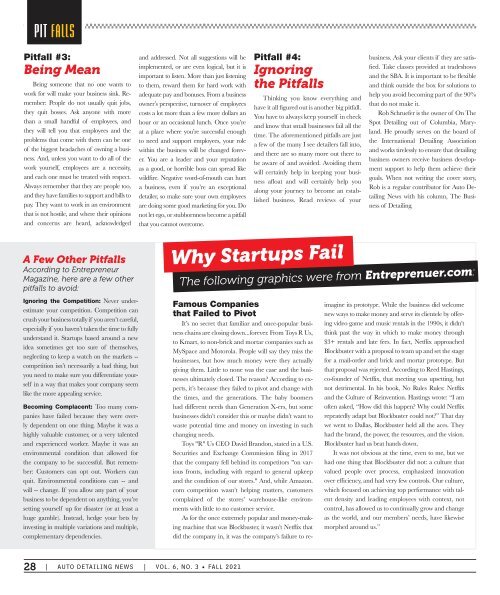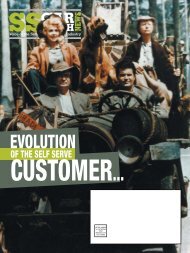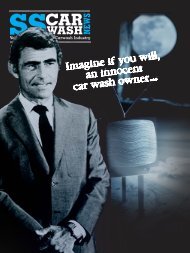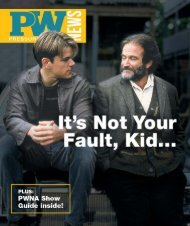2021_ADN_V6_No3_web
Create successful ePaper yourself
Turn your PDF publications into a flip-book with our unique Google optimized e-Paper software.
PIT FALLS<br />
Pitfall #3:<br />
Being Mean<br />
Being someone that no one wants to<br />
work for will make your business sink. Remember:<br />
People do not usually quit jobs,<br />
they quit bosses. Ask anyone with more<br />
than a small handful of employees, and<br />
they will tell you that employees and the<br />
problems that come with them can be one<br />
of the biggest headaches of owning a business.<br />
And, unless you want to do all of the<br />
work yourself, employees are a necessity,<br />
and each one must be treated with respect.<br />
Always remember that they are people too,<br />
and they have families to support and bills to<br />
pay. They want to work in an environment<br />
that is not hostile, and where their opinions<br />
and concerns are heard, acknowledged<br />
and addressed. Not all suggestions will be<br />
implemented, or are even logical, but it is<br />
important to listen. More than just listening<br />
to them, reward them for hard work with<br />
adequate pay and bonuses. From a business<br />
owner’s perspective, turnover of employees<br />
costs a lot more than a few more dollars an<br />
hour or an occasional lunch. Once you’re<br />
at a place where you’re successful enough<br />
to need and support employees, your role<br />
within the business will be changed forever.<br />
You are a leader and your reputation<br />
as a good, or horrible boss can spread like<br />
wildfire. Negative word-of-mouth can hurt<br />
a business, even if you’re an exceptional<br />
detailer, so make sure your own employees<br />
are doing some good marketing for you. Do<br />
not let ego, or stubbornness become a pitfall<br />
that you cannot overcome.<br />
Pitfall #4:<br />
Ignoring<br />
the Pitfalls<br />
Thinking you know everything and<br />
have it all figured out is another big pitfall.<br />
You have to always keep yourself in check<br />
and know that small businesses fail all the<br />
time. The aforementioned pitfalls are just<br />
a few of the many I see detailers fall into,<br />
and there are so many more out there to<br />
be aware of and avoided. Avoiding them<br />
will certainly help in keeping your business<br />
afloat and will certainly help you<br />
along your journey to become an established<br />
business. Read reviews of your<br />
business. Ask your clients if they are satisfied.<br />
Take classes provided at tradeshows<br />
and the SBA. It is important to be flexible<br />
and think outside the box for solutions to<br />
help you avoid becoming part of the 90%<br />
that do not make it.<br />
Rob Schruefer is the owner of On The<br />
Spot Detailing out of Columbia, Maryland.<br />
He proudly serves on the board of<br />
the International Detailing Association<br />
and works tirelessly to ensure that detailing<br />
business owners receive business development<br />
support to help them achieve their<br />
goals. When not writing the cover story,<br />
Rob is a regular contributor for Auto Detailing<br />
News with his column, The Business<br />
of Detailing.<br />
A Few Other Pitfalls<br />
According to Entrepreneur<br />
Magazine, here are a few other<br />
pitfalls to avoid:<br />
Ignoring the Competition: Never underestimate<br />
your competition. Competition can<br />
crush your business totally if you aren’t careful,<br />
especially if you haven’t taken the time to fully<br />
understand it. Startups based around a new<br />
idea sometimes get too sure of themselves,<br />
neglecting to keep a watch on the markets --<br />
competition isn’t necessarily a bad thing, but<br />
you need to make sure you differentiate yourself<br />
in a way that makes your company seem<br />
like the more appealing service.<br />
Becoming Complacent: Too many companies<br />
have failed because they were overly<br />
dependent on one thing. Maybe it was a<br />
highly valuable customer, or a very talented<br />
and experienced worker. Maybe it was an<br />
environmental condition that allowed for<br />
the company to be successful. But remember:<br />
Customers can opt out. Workers can<br />
quit. Environmental conditions can -- and<br />
will -- change. If you allow any part of your<br />
business to be dependent on anything, you’re<br />
setting yourself up for disaster (or at least a<br />
huge gamble). Instead, hedge your bets by<br />
investing in multiple variations and multiple,<br />
complementary dependencies.<br />
Why Startups Fail<br />
The following graphics were from Entreprenuer.com:<br />
Famous Companies<br />
that Failed to Pivot<br />
It’s no secret that familiar and once-popular business<br />
chains are closing down...forever. From Toys R Us,<br />
to Kmart, to non-brick and mortar companies such as<br />
MySpace and Motorola. People will say they miss the<br />
businesses, but how much money were they actually<br />
giving them. Little to none was the case and the businesses<br />
ultimately closed. The reason? According to experts,<br />
it’s because they failed to pivot and change with<br />
the times, and the generations. The baby boomers<br />
had different needs than Generation X-ers, but some<br />
businesses didn’t consider this or maybe didn’t want to<br />
waste potential time and money on investing in such<br />
changing needs.<br />
Toys "R" Us CEO David Brandon, stated in a U.S.<br />
Securities and Exchange Commission filing in 2017<br />
that the company fell behind its competitors "on various<br />
fronts, including with regard to general upkeep<br />
and the condition of our stores." And, while Amazon.<br />
com competition wasn’t helping matters, customers<br />
complained of the stores’ warehouse-like environments<br />
with little to no customer service.<br />
As for the once extremely popular and money-making<br />
machine that was Blockbuster, it wasn’t Netflix that<br />
did the company in, it was the company’s failure to reimagine<br />
its prototype. While the business did welcome<br />
new ways to make money and serve its clientele by offering<br />
video game and music rentals in the 1990s, it didn’t<br />
think past the way in which to make money through<br />
$3+ rentals and late fees. In fact, Netflix approached<br />
Blockbuster with a proposal to team up and set the stage<br />
for a mail-order and brick and mortar prototype. But<br />
that proposal was rejected. According to Reed Hastings,<br />
co-founder of Netflix, that meeting was upsetting, but<br />
not detrimental. In his book, No Rules Rules: Netflix<br />
and the Culture of Reinvention. Hastings wrote: “I am<br />
often asked, “How did this happen? Why could Netflix<br />
repeatedly adapt but Blockbuster could not?” That day<br />
we went to Dallas, Blockbuster held all the aces. They<br />
had the brand, the power, the resources, and the vision.<br />
Blockbuster had us beat hands down.<br />
It was not obvious at the time, even to me, but we<br />
had one thing that Blockbuster did not: a culture that<br />
valued people over process, emphasized innovation<br />
over efficiency, and had very few controls. Our culture,<br />
which focused on achieving top performance with talent<br />
density and leading employees with context, not<br />
control, has allowed us to continually grow and change<br />
as the world, and our members’ needs, have likewise<br />
morphed around us.”<br />
28 | AUTO DETAILING NEWS | VOL. 6, NO. 3 • FALL <strong>2021</strong>

















